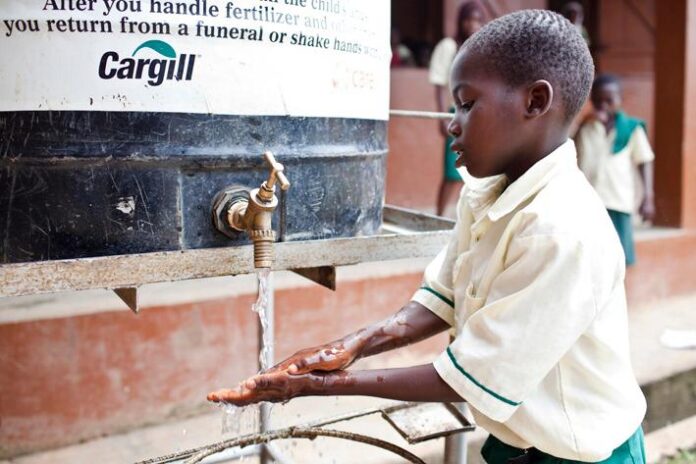
CARE and Cargill have released a report detailing the footprint of their partnership on the West African cocoa industry over the last decade.
Titled “A Decade of Impact in Cocoa Communities: More than Ten Years of the CARE-Cargill Partnership”, the report highlights the CARE-Cargill partnership successes in supporting cocoa sustainability and building better lives for cocoa farmers in Côte d’Ivoire and Ghana.
The two companies have been working together in Ghana since 2008 and in Côte d’Ivoire since 2010 to combat the many challenges facing the cocoa sector, making positive impact in six key areas.
The report says the interventions have supported the establishment of 275 community action plans, resulting in more than 160 community infrastructure improvements in both Ghana and Côte d’Ivoire.
Child labour prevention: CARE and Cargill have focused on Through preventive measures such as improved access to education for children, child labour, a prominent issue in cocoa-growing West Africa has been tackled. In Ghana, programs have focused on the development of school-related infrastructure, rehabilitation, and child labor sensitisation.
Building production capacity and diversifying income is also a mainstay of this partnership approach. Through the Cargill Cocoa Promise, Cargill’s own internal approach to sustainability, the company has been working with 132,000 smallholder cocoa farmers to support their business development in Côte d’Ivoire and Ghana. Between 2008 and 2013, CARE’s agricultural training package, combined with greater access to extension services and strong market linkage, led to a 29 percent increase in average farmer income among project-supported farmers in Ghana.
https://www.care.org/wp-content/uploads/2021/02/Decade-of-Impact-West-Africa-Report.pdf
In the area of women’s empowerment, the result from the programs have proven that In Ghana, between 2016 and 2019, there was a 30 percent increase in participation in household financial decision-making, an 18 percent increase in women holding formal leadership positions, and a 19 percent increase in opportunities to engage in formal decision-making spaces and to serve as leaders within the community.
Access to savings, loans, and other sources of credit is a core component to fostering prosperous communities and in line with that the two companies have established 376 Village Savings Loan Associations (VSLAs) comprising 9,034 members (6,853 women) in Ghana and Côte d’Ivoire. Those VSLA members have saved $301,186 while distributing $189,014 in loans.
Over the last decade, CARE and Cargill worked with communities to promote healthy nutrition practices through training and demonstration, while ensuring food security through strengthening farmer livelihoods.
In Côte d’Ivoire between 2015 and 2018, the percentage of food shocks (loss of harvest) in the CARE-Cargill intervention area were 16 percent lower thanks to interventions, with some municipalities seeing a decrease of up to 65 percent in the frequency of food shocks. Between 2013-2016, programming in Ghana also contributed to a 12.5 percent reduction in household food insecurity.
“Longstanding partnerships like the one with CARE are crucial in achieving our commitments. They allow for sharing of data and learnings, help us to accelerate our impact and measure our progress”, said Harold Poelma, President of Cargill Cocoa & Chocolate.
CARE and Cargill have continued to evolve their approach over the past decade with a focus on child labour, empowering women and improving access to agricultural inputs and financial services for farmers.
“Our current programs place women at the heart of our interventions because we know that with the right resources, women have the power to transform entire cocoa growing communities. Through an integrated approach to food and nutrition security, CARE’s work with Cargill focuses on providing women access to water, land, seeds, finance, and markets. Additionally, these programs provide nutrition and social protection in times of crisis, which is especially important in light of the effects of the current COVID-19 pandemic on cocoa growing communities,” said Michelle Nunn, President and CEO at CARE.
West Africa is the largest producer of cocoa with Côte d’Ivoire and Ghana providing nearly 60 percent of the world’s cocoa. However, while cocoa smallholder farmers make up the backbone of both the Ivorian and Ghanaian economies and contribute significantly to the global cocoa supply, many still live in poverty.
CARE has partnered with Cargill to invest in the communities they operate for more than sixty years. Since its inception, the partnership has reached more than 2.7 million people through 25 projects in 11 countries, including Brazil, Costa Rica, Côte d’Ivoire, Egypt, Ghana, Guatemala, Honduras, Mali, Nicaragua, India, and Indonesia.
Source: Ghana/Starrfm.com.gh

